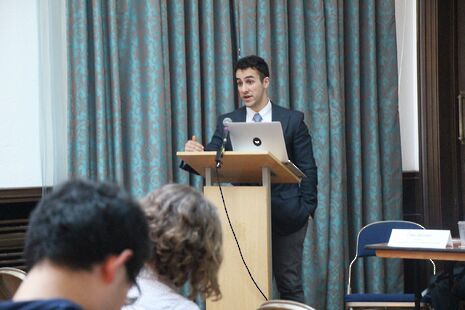Cambridge takes Brexit worries to Westminster
Community report compiled at the ‘Cambridge and Brexit: Discussing Our Future’ event to be presented to the House of Commons

Cambridge has lived up to its standing as the most pro-EU area of the country in a series of recent discussion events held across the city, culminating in ‘The Cambridge Brexit Report’, which will be presented at the Guildhall in March 2017 before being taken to Westminster and perhaps even Brussels.
From the Union Debate ‘This House Regrets the Outcome of the EU referendum’ to the ‘Cambridge and Brexit: Discussing Our Future’, students, academics and the wider community are engaging in conversation which moves beyond the divisive question of ‘Remain’ or ‘Leave’.
With the support of Cambridge City Council, ‘Cambridge and Brexit: Discussing Our Future’ took place at the Cambridge Guildhall on Friday 24th February, initiating dialogue about the role of local communities in negotiations for Britain to leave the European Union.
Attended by students, local business representatives and the wider community alike, the event provided a space for the concerns and visions of people from all corners of the city to be voiced, heard, and, above all, recorded for ‘The Cambridge Brexit Report’.
An initiative of Cambridge for Europe, The Wilberforce Society and the Cambridge University European Society, the event facilitated community panels and roundtable discussions which focussed on a variety of angles, such as economics, agricultural policy, regional concerns and youth affairs. Ideas drawn out at the conference will substantiate the work of a team of local residents, academics, students, politicians and entrepreneurs, who put together the framework for ‘The Cambridge Brexit Report’.
Matteo Mirolo, event organiser and President of the Cambridge University European Society, told Varsity: “We have targeted this event to be local based, talking about issues in the Cambridge community…the process has to be bottom up.”
Speakers also came from diverse backgrounds, with keynote addresses from Professor Catherine Barnard, professor of EU Law at the University of Cambridge, Anglia Ruskin University’s Vice-Chancellor Professor Iain Martin, and Addenbrooke’s nurse and UNISON affiliate Stuart Tuckwood. Alex Mayer, the Member of European Parliament for East England, Daniel Zeichner, MP for Cambridge, former Liberal Democrat MP for Cambridge Dr Julian Huppert and Lord Balfe of the Cambridge Conservatives also contributed to the debate.
In his address to the audience, Daniel Zeichner deemed it “absolutely disgraceful” that “people who had absolutely assumed that this was their home for ever suddenly feel that they are not welcome and that their future is uncertain.”
Zeichner’s concerns about the implications of the vote on the “89,000 EU nationals in and around Cambridge” reflect wider apprehensions about the future of the city and the University. The University of Cambridge saw a 14 per cent drop in applications from EU students this year, and warned against the risk of a perceived “anti-immigrant sentiment”.
Much roundtable discussion at the event centred around the real-life implications of the vote to ‘Leave’. A man at my table expressed his anger and worry about the situation of his wife, a Polish national who has been married to a Briton and lived in England for over a decade, but does not have the rights of British citizens. Matteo Mirolo echoed these sentiments, asserting that Cambridge will “lose” if mobility for EU nationals is not guaranteed.
He told Varsity: “Theresa May should not make of this process a political game. She should not make of this a game of alliances, a game of ambition.” He also called out to member states of the European Union, asserting: “don’t make it a revenge game.”
Another prominent angle of debate concerned dwindling public faith in democracy and sovereignty. Speaking to Varsity, former MP Dr Julian Huppert expressed frustration over “democratic” justification of a hard Brexit line. “I disagree with the idea that ‘the people voted, we can never touch it again’. We did that vote in the seventies. Some of the UKIP-ers and the Tories have been arguing since then for another vote. This time around, when they’ve won on the basis of some lies, they don’t get to say that no one can ever question that again.”
As the event came to a close, organiser and MPhil candidate Davide Martino told Varsity: “Some of the expressions of interests that we got from the House of Commons have been from people working on youth affairs, because they want to hear from us.”
“Events like these are the way that we can influence the national debate and put forward what we think.”
 Comment / The (Dys)functions of student politics at Cambridge19 January 2026
Comment / The (Dys)functions of student politics at Cambridge19 January 2026 Arts / Exploring Cambridge’s modernist architecture20 January 2026
Arts / Exploring Cambridge’s modernist architecture20 January 2026 Features / Exploring Cambridge’s past, present, and future18 January 2026
Features / Exploring Cambridge’s past, present, and future18 January 2026 News / Local business in trademark battle with Uni over use of ‘Cambridge’17 January 2026
News / Local business in trademark battle with Uni over use of ‘Cambridge’17 January 2026 News / Your Party protesters rally against US action in Venezuela19 January 2026
News / Your Party protesters rally against US action in Venezuela19 January 2026








